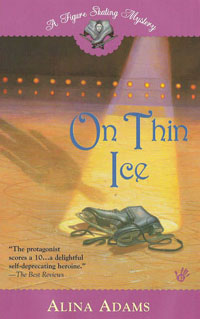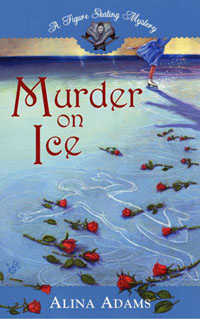FEDERATION FOLLIES
Japan Today reports that "a rumor is spreading which may have an impact on the race (to pick the women's figure skating team). It is suspected that Ando, Suguri and Arakawa are favorites because the JOC has appointed them as "symbol athletes." They are the darlings of the Japanese figure skating world. The JOC controls their image rights and the three skaters perform in various commercials."
Of course, accusations against governing federations, especially when it comes to playing favorites among the sportsmen, is nothing new in the figure skating world.
For instance, 1999 World Champion Maria Butyrskaya was perenially convinced that the Russian Skating Federation was against her. She claimed that, after the 1993 Worlds, where she failed to qualify for the final and lost Russia its only chance to send a woman to the 1994 Olympics, the Federation decided that she was finished, and did everything in their power to insure she got the message and quit.
Allegedly, the Federation tried to keep her from winning the 1996 Russian title, by, in Maria's words, pulling their darling, 1994 European Bronze Medalist Olga Markova "up by the ears" to try keeping her in first place.
Except that Olga's disastrous performance made that impossible, and the title went to Maria.
Still, the Federation refused to automatically name Maria to the World team, telling her that they would wait for the results of the Europeans (Maria finished 3rd, Olga 11th), and the results of the Centennial Competition (Maria finished 2nd ahead of Michelle Kwan), to make up their minds. Up until a week before the 1996 World Championship, Maria didn't know if she would be allowed to go. Once there, she finished 4th.
After finally winning a World title in 1999 (becoming the first Russian woman to ever do so), Maria finished 6th at the 2002 Olympics. She also finished 6th in her Qualifying Round at the 2002 Worlds, then promptly withdrew from the competition citing "physical and mental fatigue," and went home to retire from eligible skating. (Obviously, she was really tired).
Nonetheless, over-the-top claims of federation favoritism would be easier to reject if they only issued from one, rather dramatic, somewhat embittered young woman (when queried about her teammate, Irina Slutskaya, who, at age sixteen, in 1996, became the first Russian woman to win the European Championship, Maria sniped, "Of course, everything is easy when you are sixteen. Just wait for her to grow and try to do the same with a woman's body.")
Except that the 1996 World Pair Champions Marina Eltsova & Andrei Bushkov repeated Maria's charges. They too felt dismissed by their Federation.
Firstly, they believe their 1994 Olympic prospect was stolen from them by the returning professionals, Gordeeva & Grinkov, and Mishkutenok & Dmitriev. They claim their coach, Igor Moskvin, was more interested in helping with his wife, Tamara Moskvina's, team, Mishkutenok & Dmitriev, then in training his own, Eltsova & Bushkov, and that the Russian Federation, even before their Nationals, had already decided to send the reinstated pros to the Olympics, for the publicity value of it.
Despite Eltsova & Bushkov winning the 1995 Nationals, Moskvin told them it was time to quit eligible skating. Tamara suggested they become professionals, and the team did briefly join an ice-show, before deciding to give the eligible scene one more try -- this time with a coach who was actually supportive of them.
They switched to a new coach and a new choreographer, and, in 1996 won the World Championship.
But, Marina and Andrei's problems with the Federation weren't over.
Like Maria, they believed they were not the political "favorites" of the Federation, and that president Valentin Piseev preferred another team to represent Russia. In addition, though Marina and Andrei, while competing, only receive about $45.00 (200,000 rubles) a month from the Olympic Committee to defray their training expenses, they claimed the Federation hindered their earning extra income, by limiting the number of shows and Pro-Ams they can appear in.
For the record, the Federation's position is that too many shows and Pro-Ams tire their athletes out for the important, eligible competitions.
Says coach Alexei Mishin, "You can work to make a champion, or you can work to make money."
Though a great many Russian skaters still often disobey direct orders to stay home, and accept invitations to skate in Western exhibitions, while hoping Federation president Piseev won't find out....
Of course, accusations against governing federations, especially when it comes to playing favorites among the sportsmen, is nothing new in the figure skating world.
For instance, 1999 World Champion Maria Butyrskaya was perenially convinced that the Russian Skating Federation was against her. She claimed that, after the 1993 Worlds, where she failed to qualify for the final and lost Russia its only chance to send a woman to the 1994 Olympics, the Federation decided that she was finished, and did everything in their power to insure she got the message and quit.
Allegedly, the Federation tried to keep her from winning the 1996 Russian title, by, in Maria's words, pulling their darling, 1994 European Bronze Medalist Olga Markova "up by the ears" to try keeping her in first place.
Except that Olga's disastrous performance made that impossible, and the title went to Maria.
Still, the Federation refused to automatically name Maria to the World team, telling her that they would wait for the results of the Europeans (Maria finished 3rd, Olga 11th), and the results of the Centennial Competition (Maria finished 2nd ahead of Michelle Kwan), to make up their minds. Up until a week before the 1996 World Championship, Maria didn't know if she would be allowed to go. Once there, she finished 4th.
After finally winning a World title in 1999 (becoming the first Russian woman to ever do so), Maria finished 6th at the 2002 Olympics. She also finished 6th in her Qualifying Round at the 2002 Worlds, then promptly withdrew from the competition citing "physical and mental fatigue," and went home to retire from eligible skating. (Obviously, she was really tired).
Nonetheless, over-the-top claims of federation favoritism would be easier to reject if they only issued from one, rather dramatic, somewhat embittered young woman (when queried about her teammate, Irina Slutskaya, who, at age sixteen, in 1996, became the first Russian woman to win the European Championship, Maria sniped, "Of course, everything is easy when you are sixteen. Just wait for her to grow and try to do the same with a woman's body.")
Except that the 1996 World Pair Champions Marina Eltsova & Andrei Bushkov repeated Maria's charges. They too felt dismissed by their Federation.
Firstly, they believe their 1994 Olympic prospect was stolen from them by the returning professionals, Gordeeva & Grinkov, and Mishkutenok & Dmitriev. They claim their coach, Igor Moskvin, was more interested in helping with his wife, Tamara Moskvina's, team, Mishkutenok & Dmitriev, then in training his own, Eltsova & Bushkov, and that the Russian Federation, even before their Nationals, had already decided to send the reinstated pros to the Olympics, for the publicity value of it.
Despite Eltsova & Bushkov winning the 1995 Nationals, Moskvin told them it was time to quit eligible skating. Tamara suggested they become professionals, and the team did briefly join an ice-show, before deciding to give the eligible scene one more try -- this time with a coach who was actually supportive of them.
They switched to a new coach and a new choreographer, and, in 1996 won the World Championship.
But, Marina and Andrei's problems with the Federation weren't over.
Like Maria, they believed they were not the political "favorites" of the Federation, and that president Valentin Piseev preferred another team to represent Russia. In addition, though Marina and Andrei, while competing, only receive about $45.00 (200,000 rubles) a month from the Olympic Committee to defray their training expenses, they claimed the Federation hindered their earning extra income, by limiting the number of shows and Pro-Ams they can appear in.
For the record, the Federation's position is that too many shows and Pro-Ams tire their athletes out for the important, eligible competitions.
Says coach Alexei Mishin, "You can work to make a champion, or you can work to make money."
Though a great many Russian skaters still often disobey direct orders to stay home, and accept invitations to skate in Western exhibitions, while hoping Federation president Piseev won't find out....






0 Comments:
Post a Comment
Links to this post:
Create a Link
<< Home